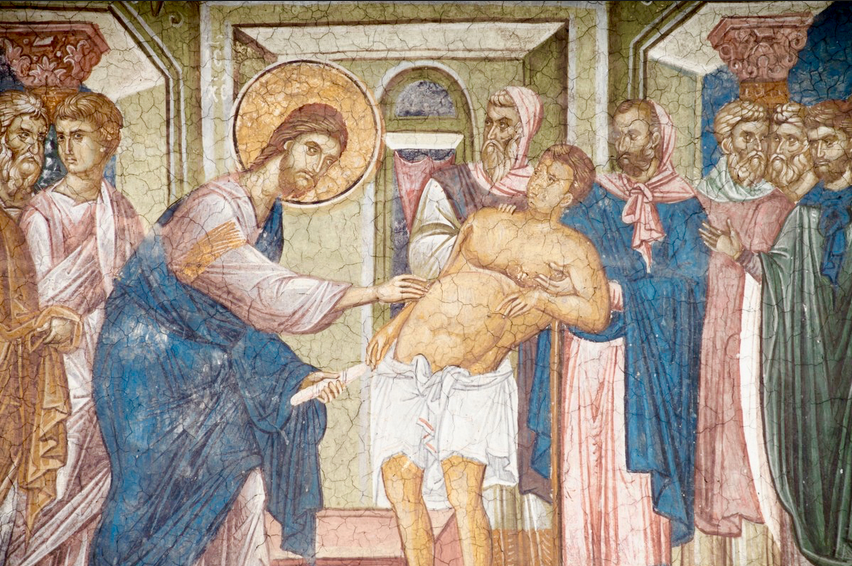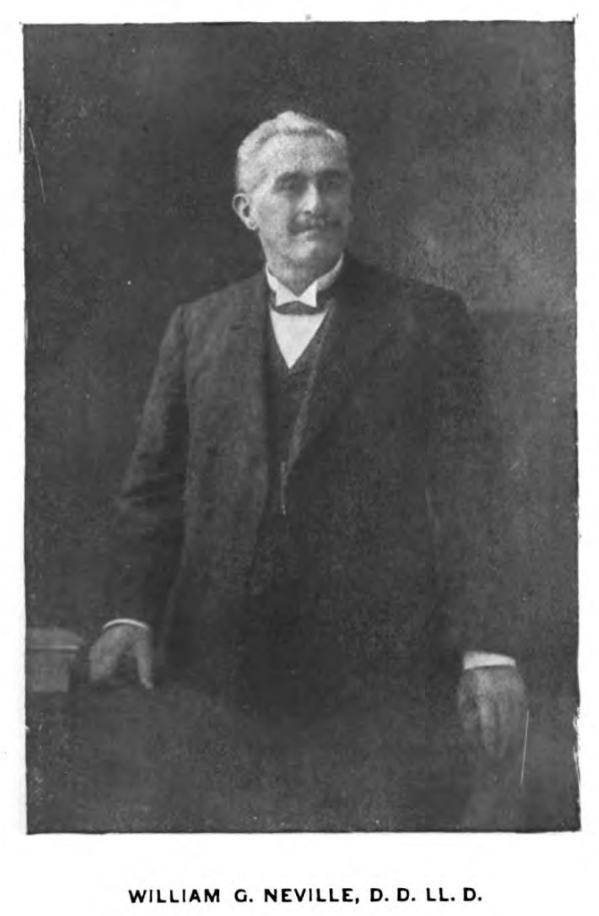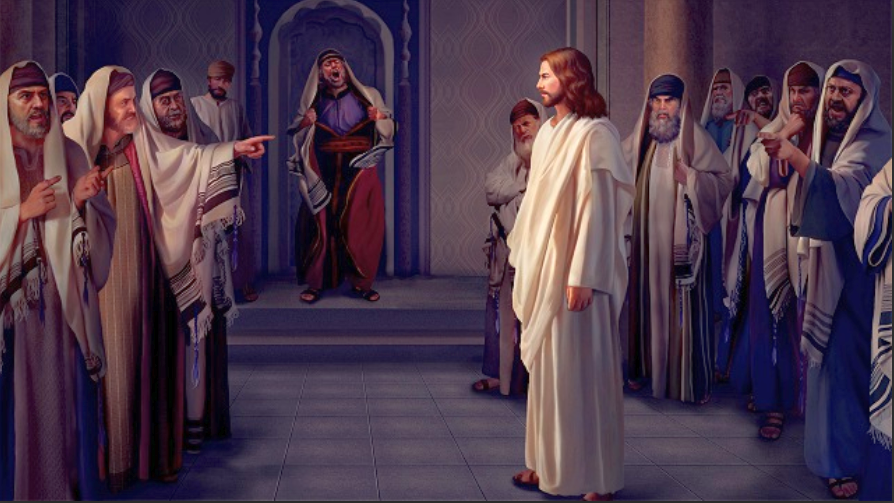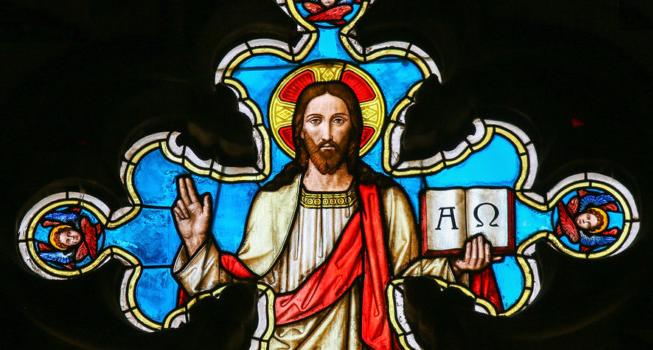
Editor’s note: The following is extracted from Sermons, by Rev. William G. Neville (published 1908).
______________________________
“They watched him.” — Luke xiv. r.
______________________________
The enemies of Christ were ceaseless in their efforts to find something in Him objectionable. They wanted to condemn Him, so they adopted every imaginable measure to accomplish their wicked end. On the present occasion, Jesus had been invited into the house of one of the chief Pharisees. Perhaps this man had some insidious design in view in entertaining the Savior. No doubt he thought that he would have a better opportunity to entrap the Savior, while He was partaking of his hypocritical hospitality, than on any ordinary occasion. It is the very height of impoliteness to take advantage of one who is sharing your hospitality. It would be very unbecoming in you to condemn a man in your own house, after he had been invited there by you. This seems to have been the treatment Jesus received at the hands of the Pharisee. It appears that this man had invited several of his brethren to his house on this occasion. While they were all there in the house of the chief Pharisee, they watched the Savior.
I. The object of their watching.
They noticed every movement which He made and every word which He spoke. Why all this watching of Jesus on the part of the Pharisees? Is He a thief, whom they are to watch for fear he will appropriate for his own use some of their goods? Ah, no. Is He a murderer, who is ready when an opportunity affords, to bring into requisition his deadly weapon, that they should watch Him so closely? Ah! no. Why, then, all this watching? It is because they wanted to find something, either in His speech or conduct, for which they could condemn Him.
This seems remarkably strange, when we first think about it, that they should desire to condemn a man so pure in life and so perfect in doctrine. But, if we will examine a little into the human heart and behold the secret emotions and workings of that heart, everything that is remarkable on the part of the Pharisees’ watching such a perfect character as Jesus vanishes, and we see that it is perfectly natural that they should watch Him. “The heart is deceitful above all things and desperately wicked.” Those Pharisees were doing nothing more than carrying out the promptings of the human heart, when they were watching Jesus, in order to find some thing in Him to condemn. And these same promptings are to be found in every human heart in its native depravity. They may not, on every occasion, develop themselves; but, I tell you, they live in the depraved, human heart. Human nature is the same the world over, and in every age. There is nothing but the power of the gospel that has ever made any permanent change in human nature. The apostle spoke from experience and also from observation, when he said: “The carnal mind is enmity against God;” and, if we know the human heart, we can say the very same thing, speaking also from experience and observation. The human heart, in its native depravity, does not love the Lord Jesus Christ; and it is ever attempting to find something in Him objectionable and worthy of condemnation. There is nothing negative in the influence which the character of Christ exerts over mankind. He elicits from every human being that forms His acquaintance the highest esteem and the purest love, or the strongest opposition and the most malicious hatred.
The Pharisees watched Him, because they wanted to find something in Him for which He could be condemned; and there are men in our midst and all over the country today who are watching Jesus just as closely as did the Pharisees, and for the very same purpose. See the combined efforts of infidel writers and infidel speakers to destroy the Bible and its sway over the hearts of men! See how the unconverted world is watching the disciples of Christ and the progress of His religion in the world! See how they have studied every sentence in the Word of God! See how they have watched the Church of God in her triumphant march through the world — how they have been chagrined when the Church was victorious, and how they have rejoiced when she was defeated! Why all this constant watching and untiring investigation of the religion of Jesus Christ on the part of the world? The answer is, to find something in it to condemn. Unconverted men do not love Christ, and they would rejoice in the downfall of His blessed religion. They want to find something to bolster themselves up in their wicked course. They know that the gospel of Christ condemns them in their wicked course; and, since they love their wickedness and expect to adhere to it, they want to find something which can be condemned in the gospel. If Christ had come into the world in a very different manner from what He did, making contrary requirements from the ones He did make, then men in their sins and rebellion against God, would have been eager to have followed Him. If He had come in pomp and splendor, erecting a magnificent temporal government, bestowing upon those who identified themselves with this government worldly honors and worldly wealth, then those proud Pharisees and their descendants who have been watching Jesus ever since, would have gladly followed the great King. But as Christ’s advent into the world was quite different from this, and as His religion was designed to revolutionize the human heart and society, requiring men to love that which they hated before, and requiring them to hate that which they had loved before — men, in their sins and iniquities, arrayed themselves against this religion and the Author of it. No doubt, too, to say the least of it, they felt the probability of the truth and divine origin of this religion which they despised. They could see the effects of this religion on the world. Wherever this blessed gospel goes, it wields a power over the hearts of some men, at least. And men, in order to be consistent in rejecting this religion, want to find something in it worthy of condemnation. O, how wicked men and infidels would rejoice if they could prove to their own minds and to the minds of others that Christianity is an imposture! But, thanks be to God, this they have never done, and this they can never do. “They watched Him.”
II. The result of their watching.
Christ knows the secrets of the heart. He knew what was in the hearts of those Pharisees who were watching Him. He knew their motives and purposes in watching him. Hence, he was fully prepared to meet all the objections which they might bring against Him. There was a man in the presence of Christ and the Pharisees who had the dropsy, and Christ was desirous of healing him; but the Savior knew what was in the hearts of those Pharisees; He knew that they were ready to catch at any opportunity to condemn Him; and He knew if he were to heal this diseased man on the Sabbath day that they would condemn Him for it. Thus He anticipates their objection, and He silences them by his overpowering logic, before He attempts to heal the poor man who had the dropsy. He propounds to them this question: “Is it lawful to heal on the Sabbath day?” The record informs us that they held their peace. This question was too hard for them to answer. They could not answer yes to this question, for then they could not inform against Him. Neither could they answer no to this question, for then they would condemn themselves, because they had done and would do again, if necessary, on the Sabbath day, works which were not near so commendable as this. Thus Christ defeated these Pharisees, His enemies, in their attempts to entrap and condemn Him. “They held their peace;” Jesus healed the poor man and let him go. He “answered them, saying, which of you shall have an ass or an ox fallen into a pit, and will not straightway pull him out on the Sabbath day? And they could not answer him again to these things.”
In every other case like this, when Christ was tried and tested by His enemies, He came out victorious. They tried every imaginable plan by which to condemn Him; but every attempt was a signal failure. They tried to entangle Him with their hard questions, whose answers would be self-condemning.
You remember the time when the enemies of Christ sent asking Him this question: “Is it lawful to give tribute to Caesar or not?” They expected to catch Him this time; for, if He were to answer their question in the affirmative, that it was lawful to pay tribute to Caesar, then the Jews would condemn Him; and, if He were to answer their question in the negative, that it was not lawful to pay tribute to Caesar, then the Romans would condemn Him. And how careful they were to send as the ones to ask the question both Jews and Romans. There were the disciples of the Pharisees, who were bold and strict advocates of Jewish liberty, there they were to stand as witnesses against Caesar; and there were the Herodians, who were fearless and adherent advocates of the Roman government, there they were to stand as witnesses for Caesar. After they had dealt in a few of their empty platitudes and compliments, they put their question to the Son of God. But the Savior was ready for them, as He was for His enemies on all occasions. He says, “Bring me a penny.” After they had given it to Him, He asks them whose image and superscription were on it. They answered “Caesar’s.” This answer was self-condemning on the part of the Pharisees, for it is a rule even in the Jewish Talmud, that “he is the king of the country whose coin is current in the country.” After they had answered that Caesar’s image was on the coin, which they were obliged to do, Jesus said unto them: “Render to Caesar the things that are Caesar’s, and to God the things that are God’s.” Thus Christ silenced His enemies by His matchless wisdom and irresistible logic.
When Christ was tried by a human court for His life, the verdict of the judge was: “I find no fault in him.” After Christ had been crucified upon the cross, when there was a great earthquake and many other demonstrations of His mighty power, the centurion and those that were with him watching Jesus, being in great fear, cried out: “Truly this was the Son of God.”
Judas, the traitor, after he had betrayed Christ, makes a remarkable confession. He says: “I have sinned, in that I have betrayed the innocent blood.”
The enemies of Christ, in every age, have been unscrupulous in their efforts to condemn Him; but as often as they have tried, so often have they failed. They have scanned and reviewed His life; they have investigated and analyzed His doctrine. They have exhausted their ingenuity to find a mistake in His life, or to pick a flaw in His doctrine. But all of these efforts have been in vain, except to confirm the truth and divinity of the gospel and to place it on a firmer basis than ever before. The unanimous testimony of the ages, both among friends and foes, is that the religion of the Bible is the purest, and the noblest, and the best that has ever been offered to mankind. The Christian religion never suffers in the end by having to pass through fiery afflictions and stormy persecutions. Some of her noblest achievements have been won in these great conflicts; and some of her mightiest bulwarks and defenses have been erected while passing through these struggles.
“It is a little cloud; it will pass away.” This was said by Athanasius of Julian the apostate, who, after a short reign of active hostility to Christianity, perished with a confession of utter failure. The same may be applied to all the recent attempts to undermine the faith of humanity in the person of its divine Lord and Savior. The clouds, great and small, pass away; the sun continues to shine; darkness has its hour; the light is eternal. No argument against the existence or attack upon the character of the sun will drive the king of day from the sky, or prevent him from blessing the earth. And the eye of man, with its sun-like nature, will ever turn to the Sun of righteousness and drink the rays of light as they emanate from the face of Jesus, the Light of the world. With its last and ablest efforts, infidelity seems to have exhausted its scientific resources. It could only repeat itself hereafter. Its different theories have been tried, and found wanting. One has, in turn, refuted and superseded the other, even during the lifetime of their champions. They explain nothing in the end; on the contrary, they only substitute an unnatural prodigy for a supernatural miracle, an inextricable enigma for a revealed mystery. They equally tend to undermine all faith in God’s providence, in history and ultimately in every principle of truth and virtue; and they deprive a poor and fallen humanity, in a world of sin, temptation and sorrow, of its only hope and comfort in life and in death.
Ah! how these infidels and skeptics have watched the Lord Jesus! But in all of their efforts to retard Christianity and defeat its plans in the world, they have signally failed. In the midst of all these conflicts, Christ stands up as the triumphant Champion of the truth, marching on to universal victory. There is no hypothesis which gives a satisfactory explanation of the life and doctrines of Jesus, except the divinity of His character and the eternity of His Sonship. He is a divine Person! He is the eternal Son of God! Hence His religion has survived every attempt to destroy its existence in the world. The gospel has succeeded and conquered, because it is founded on the principles of eternal truth.
III. A few practical lessons.
1. Let us remember that wicked men are watching Christ now just as they did when He was upon the earth. And they are watching Him for the express purpose of finding something in Him worthy of condemnation. Sin and iniquity are just as much opposed to holiness and righteousness today as they ever were. Therefore, let us not be discouraged when we see wicked men arrayed against the Christian religion.
2. As disciples of Christ, we may expect to be watched ourselves. The enemies of Christ not only watch Him, but they watch His followers as well. In a certain sense, Christians are the representatives of the Christ. Men look at us as followers of the Savior; they look at us as reflectors; and they look there to see the image of Christ. Men will judge Christ by those who represent Christ in this world. They watch us just as they watched Christ; they desire to find something in us which they can condemn. O how the world rejoices over the downfall of a Christian! They can’t find any fault in the life or character of Christ, so they naturally turn to His followers to see if they can’t find some fault in them. Men are taking knowledge of us, and when ever they can find a fault in our speech, or in our overt acts, they rejoice over the fact. The world knows a great deal more about us than we think they do. While they are watching us, let us watch them, but not for the same purpose, of course. Let us do as our Savior did; He was always prepared to meet His enemies. He was thoroughly conversant with the Word of God, and He used this mighty weapon as His defense. If we would be successful as He was, we must do as He did.
3. Let us watch ourselves. Our enemies watch us to see if they can’t find some fault in us. We ought to be like them in this respect. I don’t mean we are to watch each other; but each Christian must watch himself, and he must do this to see if he can find any fault there. It is every Christian’s constant duty to enter into a rigid and scrutinizing examination of his spiritual condition. The enemy is sure to find out where our weak points are, and right here he will make his attacks upon us. Let us, then, examine ourselves to see what our weaknesses are, so that we can go to Christ, the source of all spiritual power, and have our weakness made strength.
4. Let us watch Christ; not as the Pharisees, to find something in Him to condemn; but to find something there to love and admire. He is an object of infinite beauty and attractive loveliness. He invites investigation. In speaking of Himself and His gospel, He throws out this unconditional challenge: “Come and see.” Christ will bear the test and scrutiny of the most rigid examination, if it is carried on with honesty and without prejudice. We have an open Bible; we have an exalted Savior; we have a revealed gospel. “Come and see.” Here is the wonderful Book, which tells of the wonderful Savior, who brings us the wonderful salvation. Someone says: “The life of Jesus Christ was not spent in an obscure corner, but before the eyes of the people, before Pharisees and Sadducees, before Herod and Pilate, before Jews and Romans, before friends and foes, in Galilee, Samaria and Judea. His history was openly proclaimed again and again by eyewitnesses and pupils before the people and the Sanhedrim, from Jerusalem to Rome. It was believed by thousands of contemporary Jews and Gentiles, in spite of bitter persecution and death. It was sealed by the martyrdom of apostles, evangelists and Christians of every grade of society. It is better attested by external and internal evidence than any history in the world.”
Jesus Christ comes to us today as a tried Savior. He has been tested and tried for nineteen long centuries; and He has proven Himself true and faithful. He is presented to us today as the very Savior we need; and He is held up to us in the Word of God and in all history as the only Savior of a lost world; and He embodies in His glorious and majestic Person everything that the Bible and history claim for Him.











5